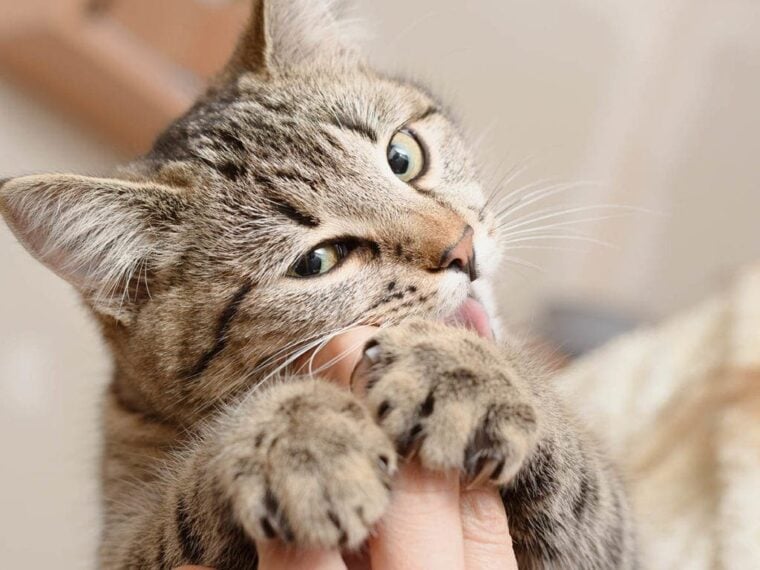
The likelihood of you personally knowing a child or adult with ADHD is pretty high, considering that it is such a common neurodevelopmental disorder. It is usually diagnosed by a doctor using medical tests to rule out other disorders, and by interviewing those close to the child. At other times, a diagnosis is done in adults instead, in such a circumstance, several other tests (such as questionnaires) might be used.
If you have a kitten or a very energetic cat, you might be wondering if they could have the condition too. As much as they might display behaviors that mimic ADHD, the condition isn’t recognized in cats as there is no clinical evidence to support it.
Kittens and many adult cats can wreak havoc during their bursts of energy by knocking things over, ripping through fabrics, attacking you as you walk, and leaping from one surface to another. However, these hyperactive activities are usually normal and part of the developmental process.
Cat Personalities: The Feline Five
A study in South Australia and New Zealand have identified five distinct personality factors in domestic cats. 1 These are neuroticism, extraversion, dominance, impulsiveness, and agreeableness. These factors aren’t a personality type, but rather traits that may affect a cat’s behavior and response to certain stimuli.

Reasons You May Think Your Cat Has ADHD
ADHD isn’t well understood but is believed to involve genetics, exposure to harmful substances (such as lead), alcohol and tobacco use during pregnancy, or even brain injury. The true cause and risk factors associated with ADHD are unknown. 2
It’s important to understand that although your cat may display certain behavioral traits that mimic ADHD, it doesn’t mean that they have the condition, as this disorder is not recognized in cats.
Hyperactivity Can Be a Warning Sign
If your cat’s behavior has changed from being relaxed and calm with occasional bursts of energy to constantly being hyperactive, disengaged, or irritable, you should take them for a checkup at their vet. Some health issues can cause new and strange behaviors in cats, and hyperactive behavior can be a response to the pain or discomfort they’re experiencing.
Hyperactivity is one of the many signs of hyperthyroidism, which is a condition when the body produces too much thyroid hormones, which increases the cat’s metabolic rate. With the increase of thyroid hormones, a cat can change from being mostly calm to switching to overdrive. You may notice other signs in your cat, such as weight loss despite an increase in appetite, vomiting, diarrhea, increased thirst, rapid breathing, rapid heart rate, restlessness, aggression, a pot belly appearance, hair loss that seems symmetrical, and thickened nails.
Jumping, running, and excessive meowing could be dismissed as signs of a hyperactive cat, but they are also signs of Feline Hyperesthesia Syndrome (FHS), which is a condition where cats have episodes of uncontrollable muscle contractions. Current research suggests that the issue might be neurological in issue and a seizure type problem. With FHS, cats often have dilated pupils, twitching skin, pain when touched, and often chase their tails and bite their backs.
Assessing Behavior Issues In Cats
Of key importance is remembering two points:
It is important to realize that cats are a distinct species, and while we do treat our pets as children, they aren’t humans in a physiological sense. Therefore, assuming your cat has a human disorder which isn’t recognized in their species and attempting to curb that behavior is an effort in vain. In all likelihood, your cat is just normal and acting instinctively as a cat would.
However, if you notice a sudden personality change in your cat, or if you have concerns that their mental well-being might be at risk, you should seek veterinary care and input before attempting to use any at-home fixes or tricks on your feline. A cat with a true neurological disorder might not benefit from training tips and tricks which are meant to retrain them.
Conclusion
ADHD isn’t recognized as a condition in cats, but it’s also not well understood in humans or animals. While some vets believe that it is possible, most behavioral traits of ADHD in humans are normal behaviors of cats. If your cat’s behavior does change or get a lot worse, you should take them to the vet as there could be a health problem that is causing their hyperactivity or aggression.
Featured Image Credit: SerPhoto, Shutterstock






